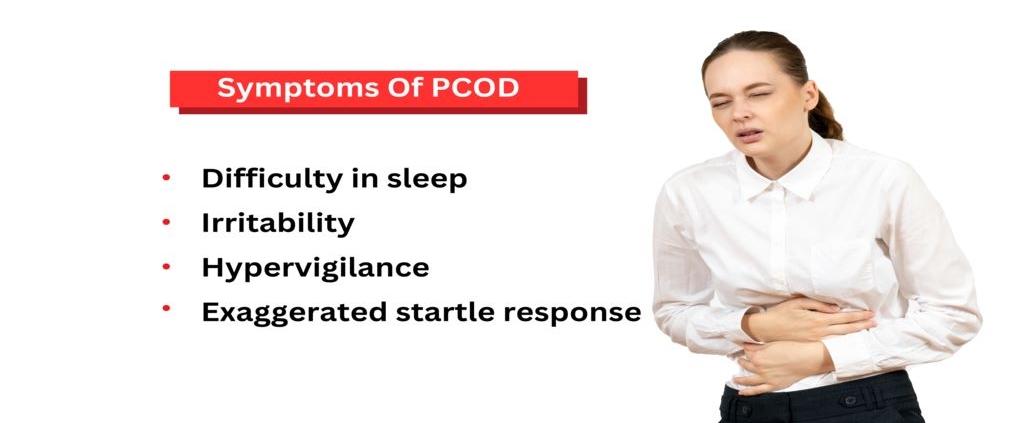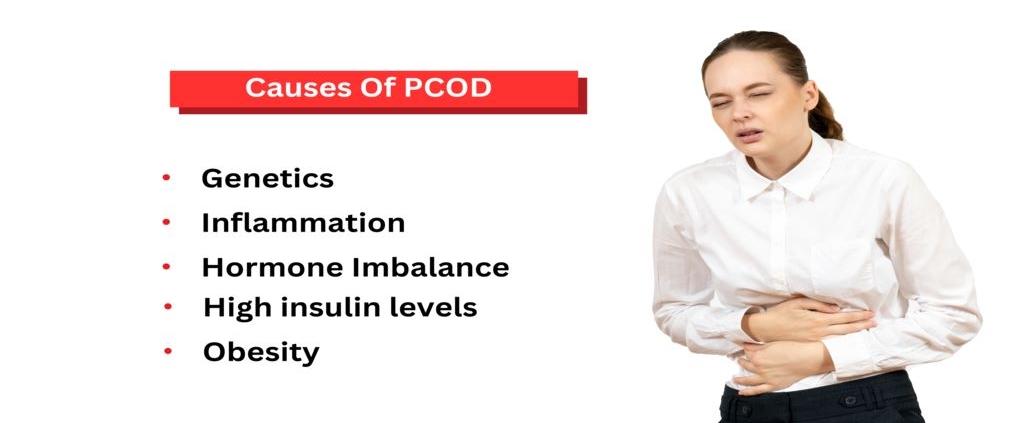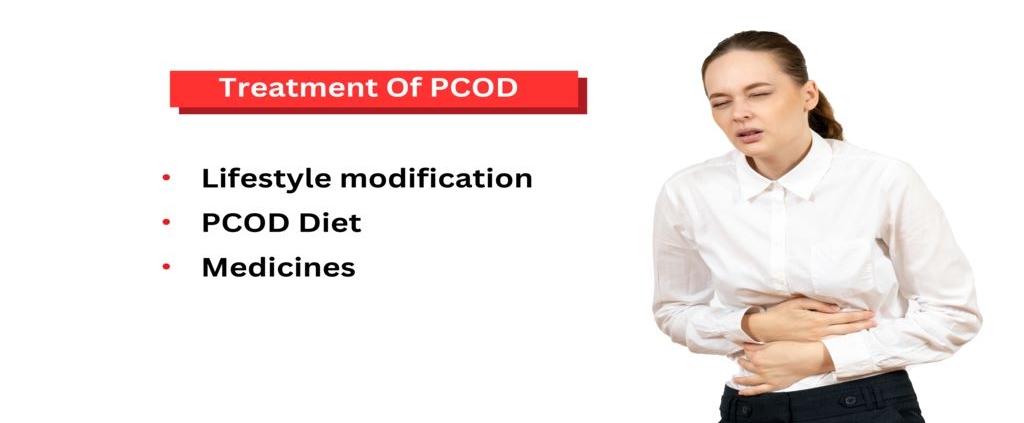Blocked Fallopian Tubes: Causes, Symptoms, and Treatment
Blocked fallopian tubes are one of the reasons for female infertility. Its medical name is Tubal occlusion. Although several risk factors can increase your chances of getting the disease, there are usually no symptoms.
The fallopian tubes are muscular tubes with a fine hair-like structure inside. These “hairs” help in both directions: They help the sperm to travel up into the uterus. Fimbriae, which look like fingers, adjoin each fallopian tube. When the ovary releases an egg, the fimbria captures and guides it.
Since most eggs are fertilized in the fallopian tubes, they are essential for fertilization. If any injured part is there, for example, by surgery or infection, scar tissue may form.
Describe Hydrosalpinx.
The Greek originates the hydrosalpinx, which means water and tube. A woman’s fallopian tubes are blocked by hydrosalpinx, which is caused by fluid buildup and enlargement at the end of the tube. The end of the tube fibroid closest to the ovary is where it usually occurs, although it can also occur at the end of the tube that connects to the uterus.
One type of infertility caused by tubal factors is blocked fallopian tubes. Fallopian tube cells secrete fluid when blocked, causing the tubes to widen. Preventing an ovulated egg from being fertilized by sperm from the ovary to the fallopian tube prevents fertilization and thus prevents pregnancy. Most likely, hydrosalpinx prevents a fertilized egg from travelling to the uterus for implantation and pregnancy, even if an ovulated egg has come into contact with sperm.
Additionally, it can lead to a dangerous ectopic pregnancy, in which the embryo implants in the fallopian tubes and becomes seriously fatal. Bilateral hydrosalpinx is the condition of having hydrosalpinx in both fallopian tubes simultaneously.
Hydrosalpinx is detrimental to fertility treatments. According to a study, the success rate of assisted reproductive technologies, such as IVF, is reduced by 50% in women with hydrosalpinx fluid compared to women without it. So doctors recommend that patients who use IVF have the hydrosalpinx surgically removed before starting treatment.
If a woman becomes pregnant (naturally or through fertility therapy), the presence of hydrosalpinx impacts the pregnancy outcome. Scientists don’t fully understand why this happens. Still, they believe that hydrosalpinx poisons the egg and embryo and damages the endometrium in such a way as to disgorge the implantation and development of the developing embryo.
Symptoms of Blocked Fallopian Tubes :
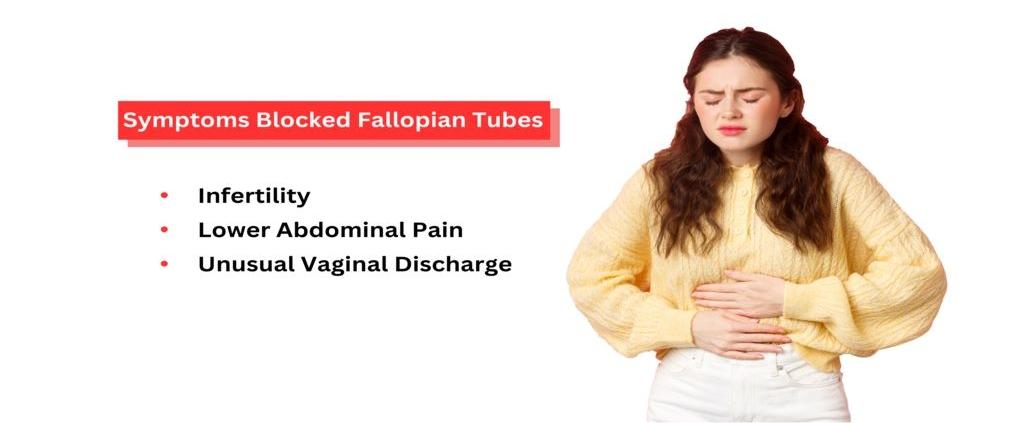
Unlike anovulation, which can be indicated by irregular periods, blocked fallopian tubes rarely cause symptoms. The first symptom of blocked fallopian tubes is infertility. In addition to regular fertility tests, if you haven’t gotten pregnant after a year of trying, your doctor may order a special X-ray to check the tubal occlusion.
Pain in the lower abdomen and abnormal vaginal discharge are possible signs of a specific type of fallopian tube blockage called hydrosalpinx, although not all women have these signs. Fertilization and pregnancy are prevented because the fluid blocks the sperm and egg.
Blocked fallopian tubes can have many causes, some of which have unusual symptoms. For example, painful periods and painful sexual activity can be caused by endometriosis and pelvic inflammatory disease (PID).
Symptoms of pelvic infection include the following:
- general pelvic pain and discomfort during sex
- nausea and vomiting
- fever over 101
- Pelvic pain with severe pain in the lower abdomen or foul-smelling vaginal discharge
Causes of Blocked Fallopian Tubes :
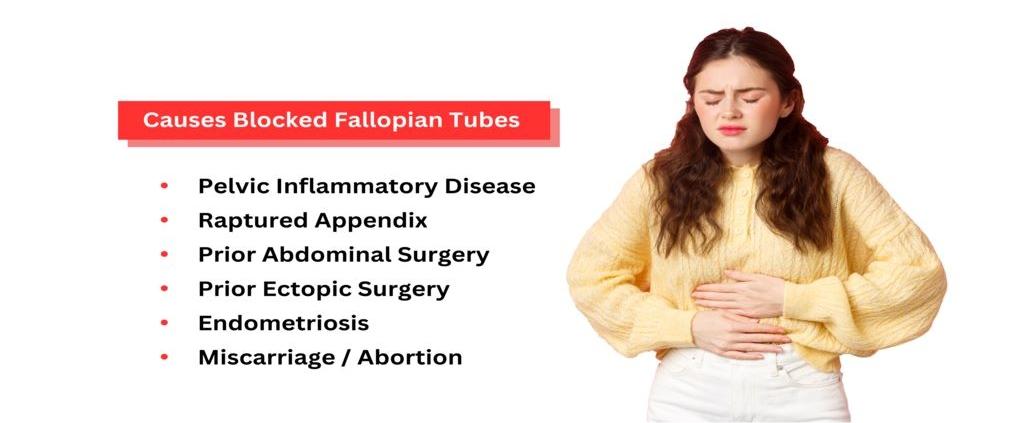
PID is the leading cause of the fallopian tube barrier. However, not all pelvic infections are associated with STDs, pelvic inflammatory disease results from an STD. Additionally, a PID or pelvic infection history increases the risk of tubal obstruction even without PID.
Additional factors that can block the fallopian tubes include:
- Currently infected or previously infected with gonorrhoea or chlamydia as an STD
- History of uterine infection resulting in miscarriage or stillbirth
- History of appendix rupture.
- history of abdominal surgery
- ectopic pregnancy in the past
- previous fallopian tube surgery, including tubal ligation
- endometriosis
Diagnosis of Fallopian Tubes:
A hysterosalpingogram, or HSG, is a specialized X-ray commonly used to identify blocked tubes. One of the basic fertility tests required of all couples who have problems getting pregnant is the HSG. A small tube injects dye into the cervix during the test. After applying the dye, an X-ray of the pelvic area is taken. If all goes well, the dye should pass through the uterus and fallopian tubes before spreading around the ovaries and into the pelvic cavity. Your fallopian tubes can become blocked if the dye cannot pass through the tubes.
It is essential to know that 15% of women experience a “false positive,” in which the dye fails to enter the tube after passing through the uterus. The site of the blockage appears to be the junction of the uterus and fallopian tubes. If this happens, the doctor may order a new test to confirm or repeat the test one more time. Hysteroscopy, exploratory laparoscopic surgery, and ultrasound are examples of additional tests that may be ordered. It is also possible to request a blood test to detect antibodies against chlamydia.
Effects on Fertility:
The ovaries, uterus, and fallopian tubes comprise the female reproductive system. Getting pregnant can be more difficult if any of these three points are affected by a medical condition. The fallopian tubes connect each of the two ovaries to the uterus. An egg releases one egg every month from the ovary, which stores and releases them randomly.
For example, the left ovary can release an egg in one month, while the right ovary releases an egg for three consecutive months. An egg can be fertilized even if one of the fallopian tubes is blocked. It is less likely to happen if both are blocked.
Treatment of Blocked Fallopian Tubes :
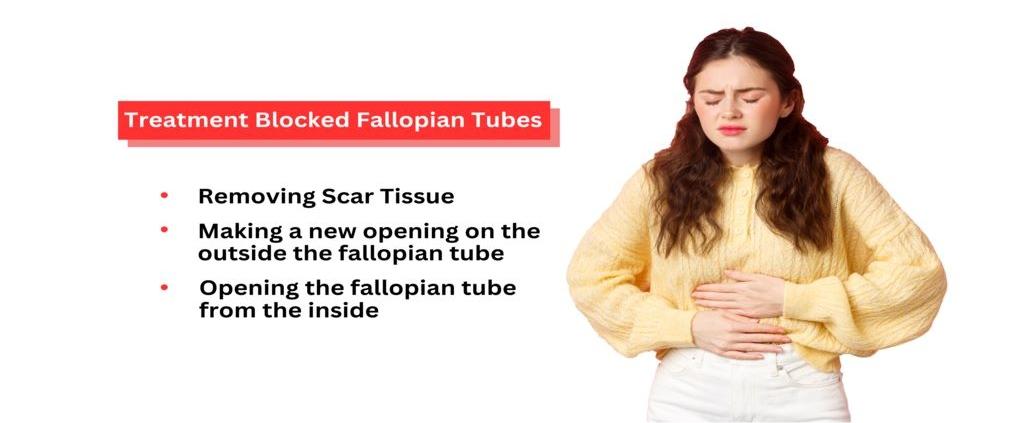
If you are healthy and one of your tubes is open, you may be able to get pregnant without too much help. Your doctor may prescribe fertility drugs to increase your chances of ovulating on the side of the still-open tube. But if both tubes are blocked, there is no other option.
It is essential to understand that although this medication is provided to aid conception, a blocked fallopian tube cannot be unblocked. Exercise, just like a clogged tube, cannot be unblocked. Surgery is the only option to help clear blocked tubes, but it is only sometimes effective. Below are those you need to know about tubal ligation, IVF, and blocked tubal surgery.
Laparoscopic Surgery
In some circumstances, laparoscopic surgery can remove scar tissue or open blocked channels. Unfortunately, this action plan is only sometimes effective. The chances of success are affected by your age (the younger, the better), the location and severity of the blockage, and its underlying cause. Getting pregnant after surgery is good if there are only a few adhesions.
After surgery to relieve the tubal blockage, the chances of ectopic pregnancy increase. If you become pregnant, your doctor should monitor you closely and be available to advise you on what would be best for you.
However, surgery is not the best solution every time. Vital scars, moderate to severe endometriosis, or moderate to severe male infertility can benefit from IVF. 10 Your doctor can discuss your case with you to determine whether it would be better to have surgery to fix it or go straight to IVF treatment.
In Vitro Fertilization
Before the development of in vitro fertilization (IVF), women with blocked tubes had no choice but to become pregnant if reconstructive surgery did not work or was not an option. IVF makes pregnancy possible.
Fertility drugs are taken to stimulate ovulation during IVF. Sperm from the male spouse or sperm donor is combined with the egg in a laboratory. Ideally, some eggs will fertilize, and others will produce healthy embryos. The uterus receives one or two selected workable embryos.
Blockages in the fallopian tubes are irrelevant. However, studies show that irritated tubes can significantly reduce the chances of IVF success. If you have hydrosalpinx, your doctor may recommend surgical tube removal. IVF may be attempted once you have recovered from your procedure.
Tubal Ligation Reversal
Reversing a tubal ligation is a permanent method of birth control, also known as “tying your tubes.” Various tubal ligations can be performed. A surgeon can cut the tubes, bandage them, sear them, or place special coils inside them, among other options.
The good news is that although this form of birth control is meant to be permanent, many women can take it off. Compared to women who undergo tubal surgery to remove blockages caused by the disease, surgical repair of tubal ligation has a higher chance of success. A microsurgical repair can be up to 50% cheaper per delivery than IVF.
Conclusion
In the above article, we have talked about blocked fallopian tubes. Blocked fallopian tubes are a possible reason for female infertility. The woman’s fallopian tubes are blocked by hydrosalpinx. There are many symptoms like fever, vomiting, pain, etc. We have shared all the details of fallopian tubes in the above article. If you want to know more about blocked fallopian tubes, this article is for you.
If you want a suggestion for treatment for blocked fallopian tubes, you can rely on Imprimis IVF & Fertility Centre. Check out this hospital for Female Infertility Treatment. It is the best Best IVF Centre in Srinagar for blocked fallopian tubes. Here you will get the cooperative staff for treatment. The treatment is affordable and delivers the best quality hospitality services in Srinagar.

